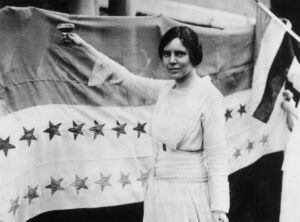
Early Life
Alice Paul was born on January 11, 1885, in Mount Laurel, New Jersey. She grew up in a family that believed men and women should be treated equally. Her mother was part of the women’s suffrage movement, which worked to get women the right to vote, and Alice often went to meetings with her. This helped inspire her to fight for women’s rights.
Alice went to Swarthmore College and graduated in 1905. She then studied in New York and earned a degree in sociology. Later, Alice went to England to learn more about social work. While there, she met Lucy Burns, who would become her close friend and partner in fighting for women’s suffrage.
Fighting for the Right to Vote
While in England, Alice and Lucy joined the women’s suffrage movement and learned how to use protests like picketing (carrying signs in front of a building) and hunger strikes (refusing to eat as a form of protest). When they returned to the United States, they joined the National American Woman Suffrage Association (NAWSA), which worked to get women the right to vote. However, Alice and Lucy believed that the fight for suffrage should focus on getting a constitutional amendment, instead of trying to win state by state. This disagreement led them to leave NAWSA and create their own group, the National Woman’s Party (NWP).
National Woman’s Party (NWP)
The National Woman’s Party used bold tactics to get attention for their cause. They organized large marches, like the one in Washington, D.C., in 1913, where thousands of women marched the day before President Woodrow Wilson’s inauguration. They also began picketing the White House in 1917. This group, known as the Silent Sentinels, stood outside the White House with signs demanding the right to vote for women. Even when the U.S. entered World War I, they continued their protests.
Many women, including Alice Paul, were arrested for their protests. In jail, Alice and other women went on hunger strikes to protest their unfair treatment. Stories about how they were treated in jail spread, which helped gather support for their cause.
Winning the Right to Vote
Alice Paul’s hard work and leadership played a big role in getting the 19th Amendment passed in 1920, which gave women the right to vote. After that, she focused on another goal: the Equal Rights Amendment (ERA). The ERA was meant to ensure that women were treated equally in all areas of life, not just voting. Alice spent the rest of her life working to make sure women had equal rights.
Legacy
Even though Alice Paul didn’t live to see the Equal Rights Amendment passed, her efforts paved the way for future generations. The amendment came close to being approved in the 1970s, but it still has not been added to the Constitution. However, Alice’s work made a lasting impact on the fight for women’s rights, and she is remembered as one of the most important leaders in American history.